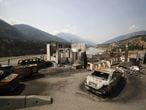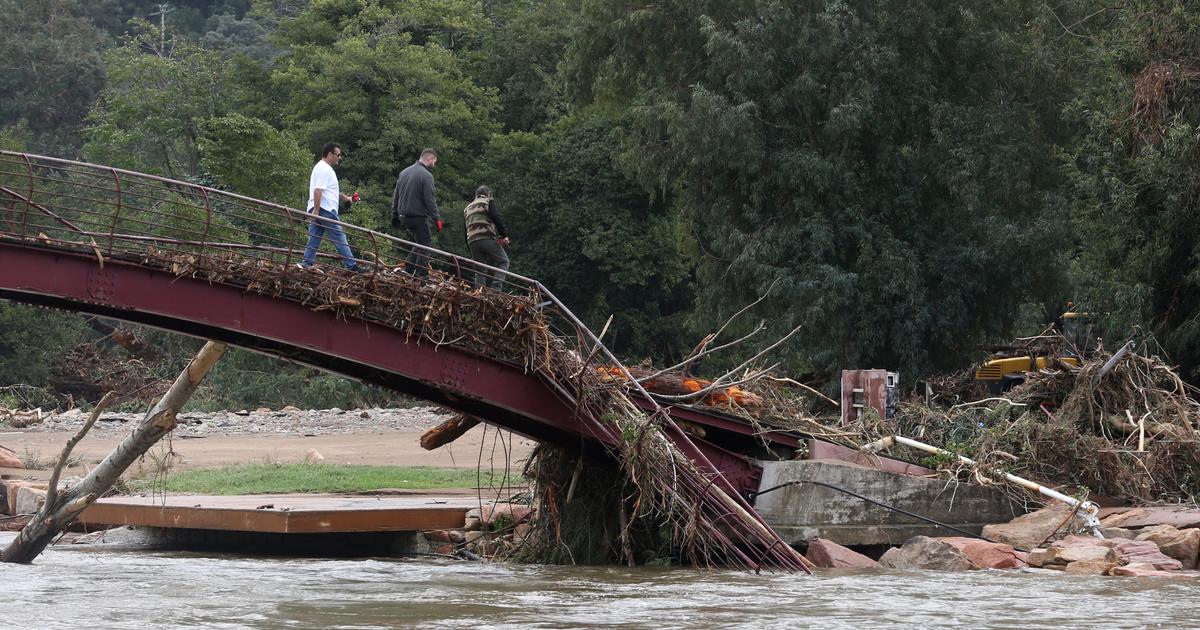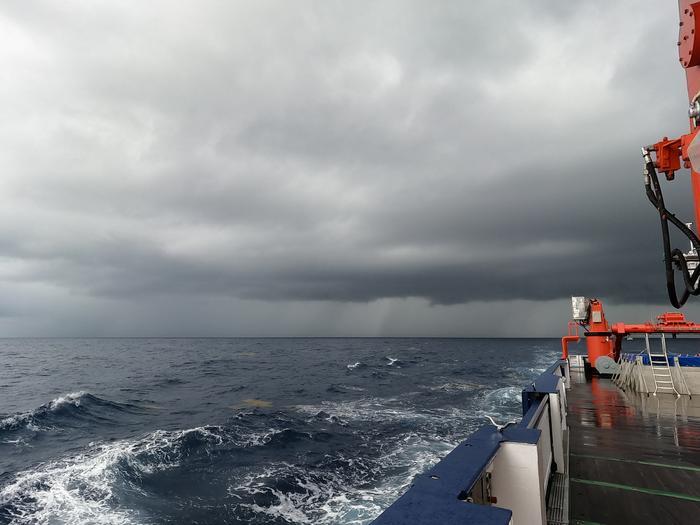It is no longer a question of something more or less probable, but of a fact. The last major status report of the IPCC, the panel of experts linked to the UN that has been laying the foundations for more than three decades on climate change, strikes denialism and considers as something "unequivocal" that humanity "has warmed the atmosphere, the ocean and the land ”, which has generated“ widespread and rapid changes ”on the planet. The previous edition of this study dates from 2013 and since then the evidence has multiplied, as have articles and scientific analyzes that show the consequences of a crisis that has already generated “unprecedented” changes in the climate in the last thousands of years. years and that in some cases will be "irreversible" for centuries or millennia. Among the direct consequences, in addition to the rise in average temperatures,extreme weather events are listed. These are events similar to heat waves or torrential rains that have been experienced in recent weeks in different parts of the globe and that have already increased in intensity and frequency due to human-generated warming, as confirmed by the report.
The study that has been made public this Monday is that of working group I of the sixth assessment report of the IPCC and 234 experts from 66 countries have participated in its preparation.
Scientists have reviewed more than 14,000 articles and references published so far to make their synthesis on the physical effects that warming has already had and the possible scenarios based on the greenhouse gases that humanity emits in the coming decades.
More information
An interactive atlas to show what the planet would be like with a 4 degree warming
Extreme weather hits the world
Fires in Turkey: "It was hell, everything has burned"
These gases are released mainly when fossil fuels are burned to generate energy and are responsible for the overheating of the planet. Since the Industrial Revolution, emissions have not stopped growing, reaching unheard-of levels today. Two examples: the concentration in the atmosphere of carbon dioxide (CO₂) - the main one - is the highest that has been reached in the last two million years; those of methane and nitrous oxide - the other two great precursors to warming - had not reached such high levels in the last 800,000 years. This has a clear consequence: the increase in global average temperature is already 1.1 degrees compared to pre-industrial levels; and the rate of global warming is such that there is no precedent for a similar process in at least the last 2.000 years, the IPCC report points out.
The study warns that the increase in temperature will continue at least until the middle of this century no matter what. As of 2050, things can get really complicated, because the level of warming will not be achieved between 1.5 and 2 degrees “unless there are deep reductions in emissions of CO₂ and other greenhouse gases in the next decades ”. In the worst case scenario, if no action is taken and emissions continue to grow at the same rate as up to now, the report estimates that by the end of this century there would be an increase of 4.4 degrees, something that would also multiply the intensity and frequency of extreme events. Scientists recall that the last time a warming level was reached above 2.5 degrees was three million years ago,when the human being did not even exist.
Projection of the increase in average temperatures on the planet with global warming of 1.5 degrees (top) and warming of 4 degrees (bottom). IPCC Atlas
The Paris Agreement, signed in 2015, set the main objective to reduce emissions so that the increase in global temperature stayed between those 1.5 and 2 degrees. And the IPCC reports also serve to notify the governments of the countries about what must be done to fulfill those commitments. Experts propose several emission scenarios during this century. In all of them, the 1.5 degree barrier is expected to be exceeded in the next 20 years due to the greenhouse gases that humanity has emitted so far and that remain in the atmosphere for decades. But Pep Canadell, director of the Global Carbon Project and one of the scientists responsible for the IPCC report, explains that the situation is not yet irreversible:In the most optimistic emissions scenario, it is still possible to achieve that the increase in temperature at the end of the century remains at 1.5 degrees, although this threshold may be temporarily exceeded in the coming years.
To stay within 1.5 degrees, “rapid, sustained and large-scale” reductions are needed, as explained by Argentine climatologist Carolina Vera, one of the vice-presidents of IPCC working group I.
Those emission reductions would take 20-30 years to have an effect on global temperatures.
But the report notes that "the benefits for air quality would come quickly."
In addition to reducing emissions, to comply with Paris it will be necessary to resort to capturing carbon dioxide that is already in the atmosphere through natural sinks, such as forests, or technological solutions, adds Canadell.
Of course, the capture through natural sinkholes is limited, so it cannot be the main solution.
Paradigm shift
Since the first of these synthesis papers was published in 1990, evidence and studies on warming have accumulated. But the final IPCC reports often use conservative language because they have to be approved by consensus among the representatives of the 195 countries participating in the climate negotiations at the UN. The scientific team of this sixth report presented its results to the countries at the end of July and during the last two weeks the final text of 42 pages presented this Monday has been negotiating and in which the debate on the influence of the human being is settled on climate change. In the writing of the 2013 report, a minimal window was left open for doubt. But eight years later it is definitively closed.
"The evidence of human influence on climate is already so overwhelming that there is no scientific doubt"
José Manuel Gutiérrez, director of the Institute of Physics of Cantabria (IFCA) and another of the report's coordinators, explains it this way: “The IPCC uses calibrated language that has to do with probabilities and with the available evidence. But human influence on climate no longer fits any of those probability thresholds and is considered to be a proven fact with no uncertainty. The evidence is already so overwhelming that there is no scientific doubt. This report uses such emphaticness not to continue with this debate; it is a fact and from there we will see how it affects and potential solutions ”. Canadell considers it to be "a paradigm shift": "We have thrown the possibilities and probabilities out of the window and it is concluded that it is a fact that the warming is due to humanity."
Attribution of extreme events
The IPCC scientific team has been working on this report for three years. But the final stage has coincided with a concatenation of extreme meteorological phenomena, such as the tremendous heat wave in late June in Canada, the floods in central Europe or China in July and the recent fires associated with heat in the basin of the Mediterranean. Precisely, another of the important novelties of the report is the one referred to these events. The IPCC states emphatically: “Human-induced climate change is already affecting many extreme weather and climate events in all regions of the world. Evidence of changes observed in extremes such as heat waves, heavy rainfall, droughts and tropical cyclones, and, in particular,its attribution to human influence has been strengthened since AR5 [the 2013 report] ”.
The town of Lytton, in Canadian British Columbia, was devastated by wildfires that followed the historic June heat wave in North America.JENNIFER GAUTHIER / Reuters
The text points out that “it is practically certain that extreme heat waves have become more frequent and intense in most terrestrial regions since the 1950s, while cold extremes (including cold waves) have become less frequent and less severe, with great confidence that human-induced climate change is the main driver of these changes ”. A similar situation arises for “the frequency and intensity of heavy rainfall events”, which have increased “since the 1950s over most of the earth's surface” and for which “human-induced climate change it is probably the main driver ”.
Sergio Vicente-Serrano, a researcher at the CSIC's Pyrenean Institute of Ecology, and one of the authors of the chapter on extreme events, points out that the evidence on this link "is much more robust than in previous reports." In 2013, for example, it was pointed out the possibility that these phenomena would increase in virulence and frequency due to the energy that was accumulating in the atmosphere due to warming. The big step that science has taken in recent years is attributing specific extreme events to human-induced climate change, such as the Canadian heat wave. It has been achieved, explains Canadell, by technological advances - for example, with more powerful computers capable of handling much more data - and by the increase in these phenomena.
The report concludes that there is a "direct relationship" between the increase in average temperatures and the multiplication of warm extremes, heavy rainfall, agricultural and ecological droughts in some regions, in addition to the increase in intense tropical cyclones and the decrease in Arctic sea ice and reduced snow cover and permafrost. The text warns that, for every half degree of global warming, there are “clearly perceptible increases in the intensity and frequency of hot extremes, including heat waves (highly probable) and heavy rainfall (high confidence level), as well as droughts. agricultural and ecological in some regions (high confidence level) ”.And it warns that "there will be an increasing occurrence of some extreme events unprecedented in the record of observation with warming", even if the goal of 1.5 degrees is achieved.
Irreversible changes
The IPCC report recalls that many changes motivated by past emissions will already be "irreversible for centuries or millennia", especially those that affect the oceans and ice sheets. The researcher Carolina Vera emphasizes that these impacts "are going to continue for hundreds or thousands of years, but they can be slowed down if emissions are reduced". For example, the sea level is expected to continue to rise during this century. Between 1901 and 2018, the increase was about 20 centimeters. And, taking as a reference the level of the period between 1995 and 2014, by 2100 the rise could be 40 centimeters in the most optimistic emissions scenario; in the most pessimistic it would double, to exceed 80 centimeters.This will contribute to “more frequent and severe coastal flooding in low-lying areas and erosion” of the coast. "Extreme events related to sea level that previously occurred once every 100 years could occur every year by the end of this century," explains the IPCC.
"Extreme events related to sea level that previously occurred once every 100 years could occur every year by the end of this century"
Smoke generated by forest fires in the city of Kysyl-Syr, in Yakutia, Siberia, in early August.
Nikolay Petrov / AP
Another critical point highlighted in the report is the Arctic, which will continue to warm more than twice as fast as the average for the planet.
This "would further amplify the melting of permafrost and the loss of seasonal snow cover, land ice and Arctic sea ice."
The scientists forecast that the Arctic "will be virtually free of sea ice in September, at least once before 2050", in all the scenarios envisaged in the report.
You can follow CLIMA Y MEDIO AMBIENTE on
and
, or sign up here to receive
our weekly newsletter






/cloudfront-eu-central-1.images.arcpublishing.com/prisa/VPFDJ6LOFBD4DJB77PGQNQCUCE.jpg)

/cloudfront-eu-central-1.images.arcpublishing.com/prisa/6YOQKRNM2VFEDJ77EV4BG7TTOQ.JPG)
